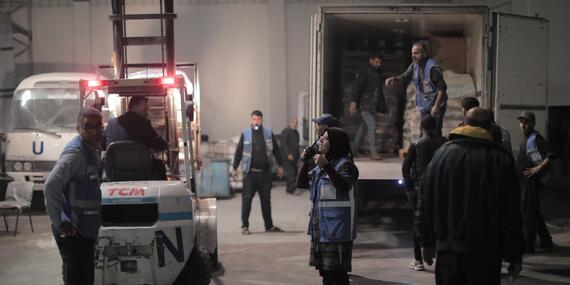Today's top news: Occupied Palestinian Territory, Lebanon, South Sudan

Occupied Palestinian Territory
Heavy bombardments and fighting in Gaza continue to result in casualties.
Yesterday morning, Médecins Sans Frontières (MSF) reported that a shell broke through the wall of an MSF shelter housing more than 100 staff and their families in Khan Younis, in the south. Five people were injured, including a 5-year-old child of a staff member, who is in critical condition.
Also yesterday, the vicinity of the European Hospital in Khan Younis was reportedly struck by drones. This follows a number of reported hits in the vicinity of the Al Aqsa Hospital in Deir al Balah, central Gaza on Sunday, forcing medical staff and patients to evacuate.
Our partners report that denials of coordinated movement requests are critically inhibiting time-sensitive responses. Since 1 January, humanitarian partners have requested 20 convoys, of which 15 were denied and 2 were unable to proceed because of delays or routes that were impassible. Only 3 went north, but only with modifications to the plan that impacted the operations.
Despite the major challenges to delivering humanitarian assistance in Gaza, our partners have provided health care and medical services to about half a million people since 7 October.
But the needs are massive – and just over a third of more than 350 formal and informal shelters for internally displaced people in Gaza have access to medical points.
At the same time, the continued denial of fuel delivery to water and sanitation facilities is leaving tens of thousands of people without access to clean water and increasing the risk of sewage overflows, significantly heightening the risk of the spread of communicable diseases.
Shelters are extremely crowded, and humanitarian partners are working there to provide essential items. Since the start of hostilities, they have reached more than 914,000 internally displaced people at both UNRWA and non-UNRWA shelters with critical assistance, including 650,000 bedding set items, nearly 27,000 tents, more than 17,000 winter clothing kits, and other critical supplies.
Lebanon
OCHA is also deeply concerned about the impact that hostilities along the Israel-Lebanon border are having on civilians.
According to latest figures available, more than 76,000 people in Lebanon have been displaced by the fighting from the south, as of one week ago.
Humanitarian access continues to be constrained, mainly along the Blue Line, which is hampering efforts to deliver essential supplies.
Many displaced by the fighting are in urgent need of winter assistance, including bedding and heaters.
Since 7 October, we and our partners have provided more than 215,000 daily meals to displaced people living in collective shelters, as well as additional food parcels for those staying in host communities.
We and our humanitarian partners in Lebanon continue our efforts to scale up the response and prepare in the event of a further escalation in hostilities, which of course would have devastating consequences for civilians on both sides of the border.
South Sudan
OCHA is extremely concerned about the well-being of refugees and returnees fleeing the conflict in Sudan – as South Sudan continues to see an influx of new arrivals from across the border.
More than 50,000 people have crossed over from Sudan in the past three weeks – with thousands of others reportedly waiting at the border to enter South Sudan.
Since the war in Sudan began in April of last year, nearly half a million people have fled to South Sudan.
OCHA is urgently calling for additional funding to meet overwhelming humanitarian needs at transit sites – and to facilitate onward transportation for new arrivals, in an effort to ease overcrowding at these facilities. Essential supplies and services are extremely limited, and there is a growing risk of disease outbreaks.
Our humanitarian partners in South Sudan are also responding to a yellow fever outbreak in the southern state of West Equatoria. Three counties there have reported 17 suspected cases and one confirmed case – with six deaths – among children between the ages of two and five.
